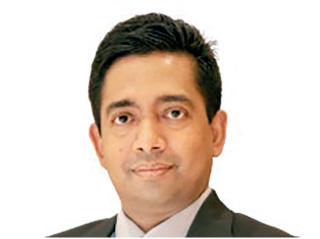Wednesday Feb 25, 2026
Wednesday Feb 25, 2026
Wednesday, 15 September 2021 00:00 - - {{hitsCtrl.values.hits}}
 |
| CFA Society Sri Lanka President Dinesh Warusavitharana, CFA |
 |
| CFA Institute Senior Head of Industry Research Rhodri Preece, CFA
|
The COVID-19 pandemic has focused investors on the interconnectedness of the financial system and intensified discussions on sustainability. CFA Institute, the global association of investment professionals, has released a new global research study that examines the state of sustainable investing and how this trend – accelerated by the COVID-19 pandemic – will shape the investment industry over the next decade.
Among the findings, 85% of CFA Institute members surveyed now say that they take environmental, social, and governance (E, S and/or G factors) into account when investing, up from 73% just three years ago. This growth has been driven by client demand, with 69% of retail investors and 76% of institutional investors having interest in ESG investing.
The report, ‘The Future of Sustainability in Investment Management: From Ideas to Reality’, explores the influences driving the sustainability trend and sets out implications for investment firms, including the need to better integrate sustainability data and to develop sustainability expertise to meet client expectations with innovative products. The research includes perspectives from over 7,000 industry participants, including investment clients, investment practitioners, ESG specialists, and more.
Although the future of sustainable investing includes many unknowns, the report advances three important tenets where sustainable investing goes further than its forerunners:
“Incorporating sustainability in investment management has become part of our industry’s mission to serve society by improving long-term outcomes,” said CFA Society Sri Lanka President Dinesh Warusavitharana CFA. “The current environment presents a unique opportunity for organisations to address this challenge and help shape a future worth investing in. As the focus on sustainability in investing gathers increasing momentum, it will eventually dictate the sustainability of investing itself.”
In addition to these findings, the report focuses on four key areas of sustainable investing
“The demand for sustainable investing continues unabated, driven by push and pull factors, catalysed by societal expectations, and accelerated by the COVID-19 pandemic,” said CFA Institute Senior Head of Industry Research Rhodri Preece, CFA. “Investment firms that incorporate sustainability into their business models need access to specialist knowledge to enrich their investment capabilities and to bridge the data gaps. Education and training in the ESG space, along with the rise of alternative data sources and enhanced disclosure frameworks, will equip firms to deliver on the potential of sustainable investing.”
In line with CFA Institute’s focus on ESG, CFA Society Sri Lanka will be launching several initiatives to increase awareness about ESG investing in Sri Lanka. The society based its flagship event; Capital Market Awards this year on a theme relating to ESG titled ‘ESG: Investing with Purpose’. The keynote speech for this event was delivered by RBC Global Asset Management Senior Portfolio Manager of Global Equities Benjamin Yeoh, CFA who explained why ESG matters, particularly in the context of the asset management industry, and the value it provides to investors as well as society at large.
The ceremony also included a panel discussion featuring key personnel from Commercial Bank of Ceylon PLC, MAS Holdings and Acuity Knowledge Partners discussing the progress and unique challenges faced when adopting ESG in their businesses.
CFA Society Sri Lanka also organised a webinar in collaboration with the Institute of Chartered Accountants of Sri Lanka. The objective of this was to encourage corporates to be more environmentally and socially responsible by embracing the concept of ESG. Speaking at the event, specialists in the field including CFA Institute APAC Advocacy Head Mary Leung, and International Finance Corporation Senior Environmental and Social Development Specialist Ruby Ojha, among others, provided insights to the audience.
The report, ‘The Future of Sustainability in Investment Management: From Ideas to Reality’ can be found on https://www.cfainstitute.org/research/survey-reports/future-of-sustainability.
For further information please contact [email protected] or CFA Society Sri Lanka [email protected].